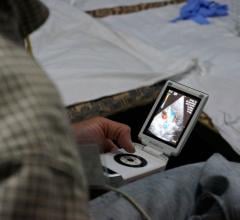A comparison of HIMSS Analytics data from September 2011 to December 2011 suggests that a number of hospital segments showed increased capability to achieve Stage 1 of meaningful use.
February 20, 2012 — ReCor Medical announced that its Paradise percutaneous ultrasound renal denervation system for achieving rhas received the CE mark. Paradise is designed to treat patients with resistant hypertension (HTN), a major risk factor for cardiovascular disease.
February 20, 2012 —Medtronic announced U.S. Food and Drug Administration (FDA) approval of the Resolute Integrity drug-eluting stent (DES) for the treatment of coronary artery disease (CAD).
Cardiac PET/CT represents a major advancement in cardiovascular diagnostics, offering significant clinical and ...
February 20, 2012 — U.S. Senate and House legislators have reached a “doc fix” agreement this week to prevent slashing payments to physicians treating Medicare patients. A law was to take effect at the beginning of March would have reduced reimbursements by 27 percent.
February 20, 2012 — Edwards Lifesciences Corp. announced that it received CE mark in Europe for its Edwards Intuity valve system for use in patients undergoing surgical aortic valve replacement (AVR).
February 20, 2012 — BG Medicine, Inc. announced positive results from its pivotal validation study for the CardioSCORE diagnostic test, previously known by the development name AMIPredict.
SPONSORED CONTENT — Studycast is a comprehensive imaging workflow system that allows healthcare professionals to work ...
February 20, 2012 — Biopharmaceutical company Celladon Corp. this week completed a $43 million equity financing to advance its lead investigational drug candidate Mydicar for the treatment of heart failure.
February 20, 2012 — As part of president Obama’s pledge to reduce regulatory burden, Health and Human Services (HHS) secretary Kathleen Sebelius announced HHS will postpone the date at which certain health care entities have to comply with International Classification of Diseases, 10th Edition (ICD-10) diagnosis and procedure codes.

As catheter-based, minimally invasive procedures expand rapidly beyond treatment of the coronary arteries into all areas of the human anatomy, angiography X-ray imaging systems have moved beyond their original purpose of simple vascular imaging. Today, in addition to interventional cardiology, cath labs are frequently shared by numerous specialists, including interventional radiology, interventional oncology, electrophysiology (EP), vascular surgeons and neurology.
Providing exceptional cardiovascular care for patients to achieve the best possible outcomes is the number one goal for ...
February 16, 2012 — U.S. Food and Drug Administration (FDA) granted 510(k) clearance for AngioDynamics NeverTouch Direct procedure kit for use with the company’s VenaCure EVLT laser vein ablation system. The NeverTouch Direct kit offers physicians the ability to treat varicose veins with fewer procedure steps by eliminating the need for a long guidewire or guiding sheath, while continuing to deliver to patients less pain and bruising compared to bare-tip fibers.
February 16, 2012 — A partnership between the American Society of Echocardiography (ASE) and GE Healthcare used technological innovations in the field to bring cardiovascular ultrasound to an underserved population in rural India.
February 16, 2012 — Few hospitals have as much experience with the Berlin Heart pediatric ventricular assist device (VAD) as DMC Children's Hospital of Michigan. This is why the U.S. Food and Drug Administration (FDA) was eager to hear testimony from Henry L. Walters III, M.D., the hospital’s chief of cardiovascular surgery.
Cardiac positron emission tomography (PET) is growing in popularity among cardiologists because it provides the ability ...
February 16, 2012 — Siemens Healthcare received clearance from the U.S. Food and Drug Administration (FDA) for syngo Aortic ValveGuide, an integrated image processing software that helps cardiologists and cardiac surgeons prepare and perform transcatheter aortic valve replacement (TAVR).
February 16, 2012 — Velomedix Inc., a clinical stage medical device company, announced it has received investigational device exemption (IDE) approval from the U.S. Food and Drug Administration (FDA) to evaluate the use of rapid therapeutic hypothermia for the treatment of patients suffering an acute myocardial infarction (AMI or heart attack).
February 16, 2012 — Aptus Endosystems, a company developing advanced technology for endovascular aneurysm repair (EVAR), announced the start of ANCHOR; a global, multicenter, prospective post-market registry evaluating the use of the HeliFX aortic securement system in the treatment of aortic aneurysms.


 February 21, 2012
February 21, 2012
















